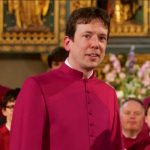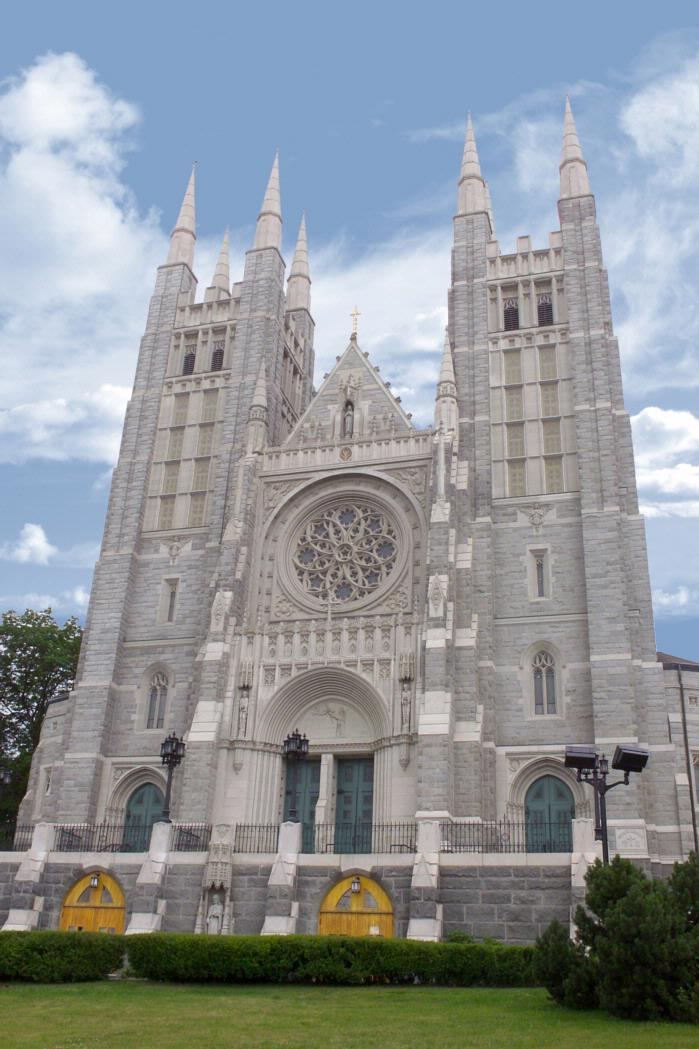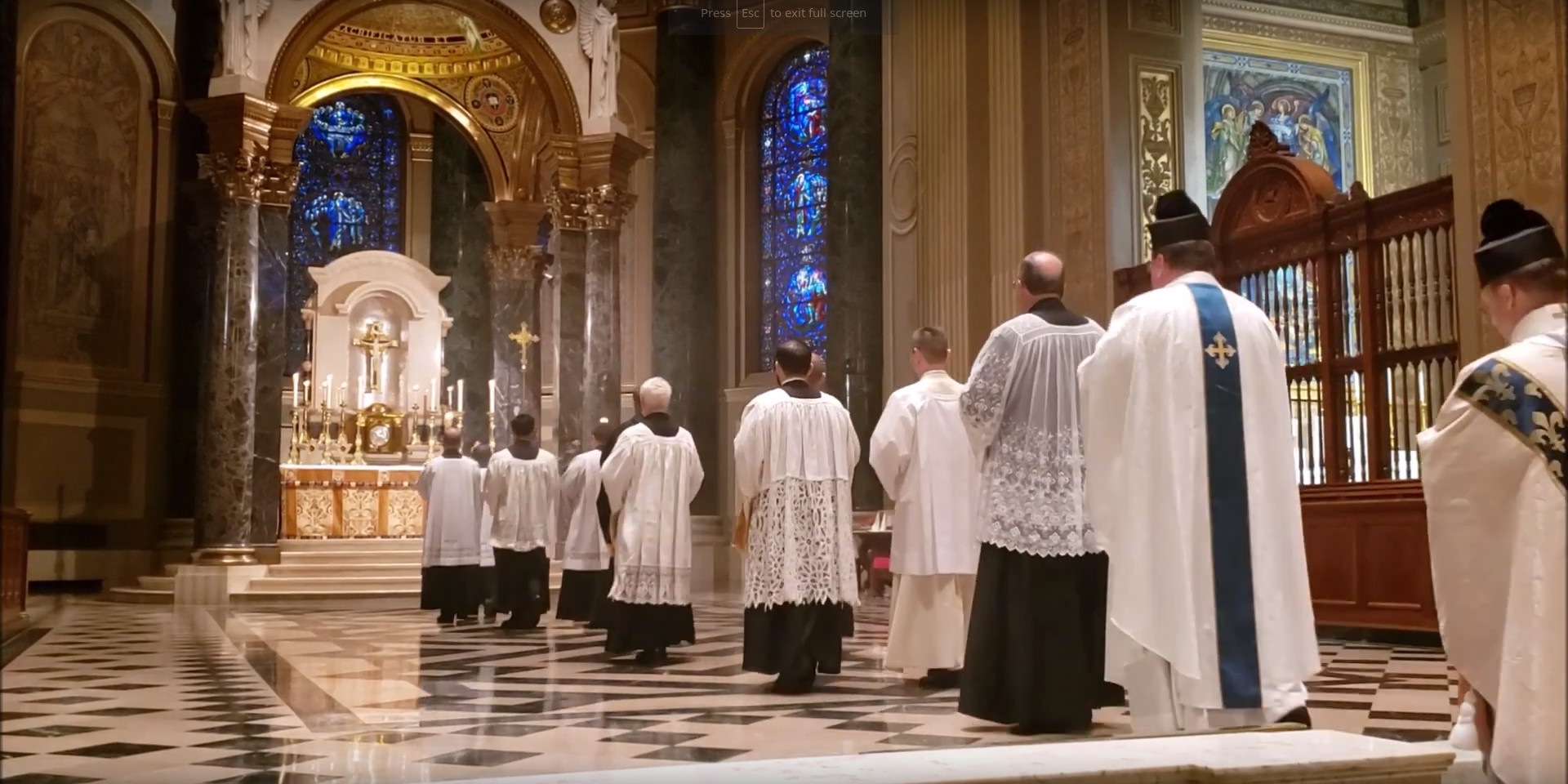Dr. Thomas Fielding, organist and director of music at St. Augustine Cathedral in Kalamazoo, will be performing tonight at the Basilica of SS. Peter and Paul in Lewiston, Maine, to help dedicate a new console for that beautiful church’s impressive Casavant. For those unable to attend the event, here is a recent conposition of Dr. Fielding’s, his Versets on the Veni Creator:
From the Colloquium: Vespers, July 5
On Friday evening of the Sacred Music Colloquium in Philadelphia, Vespers were celebrated for the feast of St. Anthony Maria Zaccaria according to the traditional Roman office, with Fr. Robert Pasley, chaplain of CMAA, presiding. The choir was conducted by the Rev. Mr. Edward Schaefer, and the organist was Professor Ann Labounsky.
- Frescobaldi: Variations on Iste confessor
- Deus in adjutorium
- Psalm 141
- Interlude
- Psalm 143
- Interlude
- Psalm 144
- Chapter
- Brief responsory
- Hymn: Iste confessor
- Versicle
- Interlude
- Magnificat: antiphon and verses
- Interlude
- Magnificat: conclusion
- Litany
- Pater noster
- Oratio
- Benedicamus Domino
- Prayers at the end of the Office
- Salve Regina
- Final prayer
- Adolph Marty: Variations on Iste confessor and Ave maris Stella
A Marian Mass in Spanish (Colloquium Mass audio)
Again this year the Sacred Music Colloquium included a Mass celebrated in Spanish: this time a votive Mass of Our Lady of Guadalupe, with wonderful music of the Spanish Renaissance, on Thursday, July 4.
The Mass setting was La misa Caça by Cristobal de Morales, and the Mass included motets by Guerrero and de la Torre. The propers were sung in new plainchant adaptations by Janet Gorbitz and Jennifer Donelson. Music for the Mass can be viewed in the colloquium repertoire book at pages 103-134, except for a motet by Cornelius Verdonck of the Spanish Netherlands, which was a late substitution.
Photos by Charles Cole are on-line at New Liturgical Movement, and here are audio excerpts:
-
- Prelude: Bach, Fantasia super “Komm, heiliger Geist” (BWV 651)
- Processional interlude
- Introit: Un gran señal
- Kyrie: Morales: La misa Caça
- Gloria: Morales, La misa Caça
- Psalm: Tú eres la honra de nuestro pueblo (Mahrt/Cabezon)
- Alleluia, Dichosa tu
- Offertory: Dios te salve, Maria
- Interlude
- Motet: Verdonck, Ave gratia plena
- Interlude
- Sanctus/Benedictus: Morales, La misa Caça
- Padre nuestro
- Agnus Dei: Morales, La misa Caça
- Communion: Nos ha hecho
- Interlude
- Motet: Guerrero, O celestial medicina!
- Interlude
- De la Torre: Adoremoste, Señor
- Vierne: Toccata from Suite Nr. 2, op. 53:
Thanks to the anonymous attendee who posted a video of portions of the Mass on-line; the above image is a screenshot from it.
Colloquium Mass Audio: July 3: Feast of St. Thomas, Apostle
On the third day of the CMAA Sacred Music Colloquium, Fr. James Richardson offered Mass in the Ordinary Form on the feast of St Thomas the Apostle, at the Cathedral Basilica of Ss Peter and Paul in Philadelphia. The Latin propers were sung with Gregorian Mass IV; among the the motets sung were Quia vidisti me, Thoma by Hassler, Mitte manum by Isaac and O salutaris hostia by Anerio. Organist Michael Garrepy performed works by Mendelssohn and Bach. Photos by Charles Cole are on-line at New Liturgical Movement, and here are audio excerpts:
1. Prelude: Mendelssohn: Op. 37, Nr. 2 (partial recording)
2. Processional
3. Introit: Mihi autem
4. Kyrie, Mass IV (Cunctipotens genitor Deus)
5. Gloria IV
6. Gradual: Nimis honorati sunt
7. Alleluia: Gaudete justi
8. Credo III
9. Offertory: In omnem terram
10. Hassler: Quia vidisti me
11. Sanctus IV
12. Pater noster
13. Agnus Dei IV
14. Communio: Isaac: Mitte manum tuam
15. Anerio: O salutaris hostia
16. Bach: Kyrie (Gott Heiliger Geist), BWV 671
Charles Cole on “The World Over Live”
 Charles Cole, Director of the London Oratory Schola Cantorum, speaks to EWTN’s Raymond Arroyo on the boy choir’s tour in America, highlighting sacred music of Spain:
Charles Cole, Director of the London Oratory Schola Cantorum, speaks to EWTN’s Raymond Arroyo on the boy choir’s tour in America, highlighting sacred music of Spain:
The World Over Live, July 18, 2019
Dom Alcuin Reid on “liturgical integrity”
On Wednesday, July 3, liturgical scholar Dom Alcuin Reid, prior of the Monastère Saint-Benoît in the diocese of Fréjus-Toulon, France, gave the second plenary lecture at CMAA’s Sacred Music Colloquium, at the Cathedral of Saints Peter and Paul in Philadelphia. His talk on authority in liturgy recalls the teaching of Pope Pius XII in Mediator Dei that
“Liturgy is a constitutive element of the holy and living Tradition.” The liturgy, the liturgical rites themselves, are an intrinsic part of the handing on of the faith received from the apostles. They are not mere decoration or ornament. The rites and prayers that have developed in the life of the Church are sacred vessels which bring apostolic tradition to us. Thus they are privileged sacramentals worthy of profound respect.
That is why Catholic liturgy is sacred. That is why Catholic liturgy is not that which any individual or group ‘likes’ to do, but is what we do ecclesially, in accordance with what is handed on to us in tradition. That is why the Sacred Liturgy enjoys a theological objectivity and cannot be altered without the greatest of prudence and due proportionality.
Against a subjectivism that would make the liturgy depend on “whatever the priest wants” or whatever this or that particular pope wants, according to personal opinions, Reid proposes principles of “liturgical integrity”. A text of his lecture appears in Catholic World Report.
First audio from the Colloquium: Tuesday, July 2
Here are some sample recordings from the Sacred Music Colloquium held in Philadelphia this month.
Tuesday, July 2
In the morning, Sr. Maria Kiely, OSB, an instructor in Greek at the Dominican House of Studies in Washington, presented a talk on the six vesper hymns long associated with the name of St. Gregory the Great: Lucis creator optime, Immensae caeli conditor, Telluris ingens conditor, Caeli Deus sanctissime, Magnae Deus potentiae, and Plasmator hominis Deus. The themes of the six hymns reflect the unfolding of creation in the six days of the Genesis account. (approx. 60 min.)
Tuesday afternoon, after the first rehearsals of the various choirs that formed for the week, a votive Mass of the Holy Angels was celebrated in English. Here are a few excerpts (please note that these are my amateur recordings, so there is incidental noise):
Procession (improvisation by Michael Olbash, organ):
Introit (plainchant by Fr. Samuel Weber, OSB):
Responsorial Psalm (George Elvey, arr. Mahrt):
Communion (plainchant by Fr. Samuel Weber, OSB):
Motet (Richard Farrant: “Call to Remembrance”):
Motet (Richard Terry: “Richard de Castre’s prayer to Jesus”):
Postlude (Bach: “Fantasia in G”, BWV 572)



